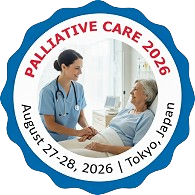Session/Tracks
Track 1: Palliative Care
Palliative care is a specialized approach to medical care that focuses on improving the quality of life for patients facing serious illnesses. It aims to provide relief from pain and other distressing symptoms while addressing the emotional, social, and spiritual needs of patients and their families. Palliative care can be integrated alongside curative treatments and is intended to enhance comfort and well-being and minimizing suffering. It involves a collaborative effort among healthcare professionals to create personalized care plans that consider patients' unique preferences, values, and cultural backgrounds.
Track 2: Hospice
Hospice care is a specialized form of compassionate healthcare provided to individuals who are in the final stages of a terminal illness, typically with a life expectancy of six months or less. Its primary focus is on ensuring the comfort, dignity, and emotional well-being of patients during this critical phase. Hospice care aims to alleviate pain and manage symptoms while also providing psychological, emotional, and spiritual support for both patients and their families. It emphasizes creating a peaceful and supportive environment where patients can spend their remaining time with dignity and quality of life. Hospice care is delivered by a multidisciplinary team of healthcare professionals who work together to address various aspects of patients' needs, aiming to create a meaningful and comfortable end-of-life experience.
Track 3: Wellness
Wellness encompasses a holistic state of optimal health and well-being that goes beyond the absence of illness. It involves actively pursuing a balanced lifestyle that nurtures physical, mental, and emotional health. This includes adopting healthy habits, such as regular exercise, nutritious eating, and adequate sleep, to promote physical vitality. Additionally, wellness emphasizes mental and emotional resilience, encouraging practices like stress managing , mindfulness, and positive social connections. Striving for wellness involves recognizing the interconnectedness of these dimensions and making conscious choices that support overall thriving and a high quality of life.
Track 4: Compassionate Care
Compassionate care is a heartfelt approach within healthcare that places emphasis on providing empathetic and kind-hearted treatment to patients. It recognizes the emotional and psychological aspects of illness, ensuring that patients are not only physically cared for but also emotionally supported. This form of care involves actively listening to patients, understanding their concerns, and addressing their fears and worries. Compassionate care fosters a sense of trust between healthcare providers and patients, creating an environment where patients feel valued and understood. It also extends to considering the well-being of the patient's family, acknowledging their emotions and offering support during challenging times.
Track 5: Holistic Approach
A holistic approach to healthcare is a comprehensive perspective that considers the entirety of an individual's well-being – mind, body, emotions, and spirit. It acknowledges that these elements are interconnected and influence each other's health and wellness. This approach goes beyond solely treating symptoms and instead aims to address the underlying factors that contribute to a person's health status. By focusing on the broader context of an individual's life, including lifestyle, relationships, and environment, a holistic approach seeks to promote optimal health and prevent illness. This way, healthcare providers can offer personalized care that takes into account the unique needs and circumstances of each patient, leading to more effective and sustainable outcomes.
Track 6: End-of-Life Care
End-of-life care is a specialized form of healthcare provided to individuals who are approaching the final stages of their life due to a terminal illness or advanced age. The primary objective of end-of-life care is to ensure that patients experience a dignified and comfortable transition, focusing on maintaining their quality of life and managing pain and symptoms. This type of care also includes emotional and psychological support for both the patient and their family, helping them navigate the complexities and challenges of this sensitive phase. End-of-life care involves open communication about the patient's wishes and preferences, as well as facilitating discussions about advance directives and any medical decisions that need to be made. Ultimately, the goal is to honor the patient's autonomy and values while providing a compassionate and caring environment.
Track 7: Patient Autonomy
Patient autonomy refers to the right of patients to make informed decisions about their medical treatment and care, based on their personal values, preferences, and wishes. It underscores the importance of respecting individual choices.
Track 8: Cultural Sensitivity
Cultural sensitivity involves being aware of and respecting the cultural backgrounds, beliefs, and practices of patients and their families. It ensures that healthcare services are provided in a culturally appropriate and respectful manner.
Track 9: Interdisciplinary Collaboration
This approach recognizes that healthcare challenges often require expertise from multiple disciplines to address complex and multifaceted issues. By combining the knowledge and skills of different healthcare providers, such as doctors, nurses, social workers, therapists, and more, interdisciplinary collaboration enhances the quality of care and improves patient outcomes. This collaborative effort promotes a holistic understanding of patients' needs, as well as the development of integrated treatment plans that consider medical, emotional, social, and other aspects. Effective interdisciplinary collaboration requires open communication, mutual respect, and a sharing goal of providing the best possible care for patients while ensuring that no aspect of their well-being is overlooked.
Track 10: Evidence-Based Practice
Evidence-based practice (EBP) is a cornerstone of modern healthcare that involves making clinical decisions and providing patient care based on a combination of the best available scientific evidence, healthcare professional expertise, and the preferences and values of the patient. It integrates research findings, clinical knowledge, and patient input to ensure that medical interventions are not only effective but also tailored to individual needs. EBP aims to bridge the gap between scientific knowledge and clinical practice, promoting the use of treatments and approaches that have been rigorously tested and proven to be safe and beneficial. By relying on a systematic and well-informed approach, EBP enhances the quality of patient care, encourages critical thinking among healthcare professionals, and leads to more successful health outcomes.
Track 11: Ethical Considerations
Ethical considerations involve evaluating the moral dimensions of medical decisions, particularly in sensitive areas such as end-of-life care. Ethical discussions may revolve around respecting patient autonomy, promoting dignity, and balancing medical benefits and burdens.
Track 12: Innovations in Healthcare
Innovations in healthcare encompass new technologies, treatments, and practices that improve the delivery of medical services. In the conference, this term may relate to advancements in palliative care, hospice, and wellness services.
Track 13: Quality of Life
Quality of life refers to an individual's overall well-being and satisfaction with various aspects of their life. In the context of palliative care and hospice, enhancing the quality of life involves addressing physical comfort, emotional needs, and social engagement.
Track 14: Patient-Centered Care
Patient-centered care emphasizes tailoring healthcare services to meet the unique needs, preferences, and values of each patient. It recognizes that patients are active partners in their care decisions.
Track 15: Global Networking
Global networking involves creating connections and fostering collaborations among professionals, researchers, and advocates from around the world. This collaboration helps to share knowledge, exchange best practices, and collectively work toward improving palliative care, hospice, and wellness on a global scale.


















